Episode 357: Engaging Customers Through Experience and Inspiration with Scott Paris of High Hand Nursery & announcing our 2019 Slow Flowers Summit Venue
July 11th, 2018
Podcast: Play in new window | Download
Subscribe: Apple Podcasts | Podcast Index | RSS | More
As I mentioned during last week’s show, we’ve just experienced the fourth annual American Flowers Week — the original domestic floral-promotion holiday that’s an inclusive campaign filled with local, seasonal and beautiful flowers and foliage in all 50 states!
This virtual campaign gave me a peek into all corners of the U.S. as I witnessed flowers, farms, creativity and events taking place in region all around the country, as well as connections across social media platforms.
And, during the heart of American Flowers Week, we held the 2nd annual Slow Flowers Summit. As an interactive, LIVE element of the campaign, the Summit drew more than 100 attendees — speakers, designers, flower farmers, innovators, influencers and leaders in the Slow Flowers Movement.
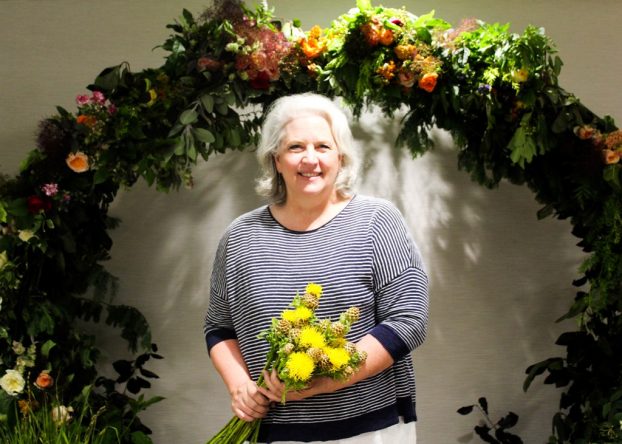
Even though we were inside a hotel conference room, the space was filled with flowers, including the Moon Arch that everyone had a hand in designing (c) Niesha Blancas
In the coming weeks, I hope to release all sorts of content from the D.C. Slow Flowers Summit.
See a gallery of Slow Flowers Summit 2018 photos here.
But for now, I want to share a few words from my opening remarks on June 29th. Please bear with me — it’s personal and as my husband would say, probably contains too much “back-story,” but that’s how I am.
I thought I’d take a moment to acknowledge how significant it is that we’re all here at the Slow Flowers Summit for Year Two. How did this come to be?
There had been talk over the years of a conference focused on domestic flowers, including some initial conversations I had with folks at the California Cut Flower Commission and the SF Flower Mart several years ago.
The desire was real, but the idea never went anywhere, and it later became clear that the Slow Flowers Community wanted something different — more intimate and inclusive — than a big industry event.
So what brought us from idea to reality? Before I left Seattle to travel here, I pulled out an email from April 2015, sent to me by one of our speakers, Mary Kate Kinnane of The Local Bouquet.
The email’s subject line read: NEW IDEAS.
I hope all is well with you and the family and I’m hoping that the Slow Flowers movement has new and exciting things coming its way. I have been wanting to contact you since I returned from my amazing experience at the Chapel Designers conference in NY and especially after meeting people like Jimmy Lohr of greenSinner and others. My wheels have been spinning and so I wanted to share some of my ideas with you.Jimmy and I discussed how our Slow Flowers family needs an event like what Holly Chapple has created for florists across the United States. An event that would gather designers from across the United States who have pledged to use local and American grown flowers to network and train with each other from experts in our field.
I think it is time we bring the Slow Flowers website to life with an event at which all of the flower farmers and florists who have pledged to use their local and seasonal blooms get together and network. I think it would be great to actually gather everyone together to talk (farmer and florist). Let’s start with the East Coast. [well, Mary Kate, we started last year in Seattle, but yes, today, we’re here on the East Coast!]
She closed by saying: I am really proud that we are still able to stick to our mission of staying 100% American and locally grown in everything we buy. Now that I have bombarded you with ideas and thoughts, let me know if any interest you (because obviously we can’t do it all)!
We had a few lighthearted email exchanges, and while nothing happened immediately, the idea stuck with me because that was the year we launched American Flowers Week in 2015.
The following year, in 2016, I had a memorable conversation with Amy Stewart, author of Flower Confidential, the groundbreaking book that stimulated awareness of sustainable practices and flower sourcing in our industry. We both remarked that the 10-year-anniversary of Amy’s book would take place in 2017. Amy turned to me and said, “we should do something together to commemorate it.” I think she meant YOU should do something, Debra.
The seed that Mary Kate had planted grew a few more roots that day.
Weeks later, during the 2016 SF Flower & Garden Show, I attended a dinner where a very similar conversation took place, with Christina Stembel of Farmgirl Flowers, Teresa Sabankaya of Bonny Doon Garden Co., who spoke last year, Beth Van Sandt of Scenic Place Peonies, and Bay Area florists Susan Kelly and Kathleen Williford — all Slow Flowers Members. We spoke further about a Slow Flowers “live” gathering, and agreed to continue brainstorming at a workshop Teresa and I were to teach together later that year at her studio in Santa Cruz.
By then, it was September 2016, and I couldn’t let go of the notion that hosting a live conference during American Flowers Week would be a great way to celebrate what was a virtual, social media-centric event. I attended the TEDxSeattle conference a few months later and found myself enjoying the presentations, but spending more time analyzing the structure and flow of the conference — projecting my ideas onto that very successful framework at which a number of speakers and topics are presented in a single day.
Over the holidays, I called Amy and asked, “If I host a Slow Flowers Summit, will you give the keynote?” She said YES, and I jumped right in, finding a venue in Seattle and inviting a fabulous lineup of speakers. The Summit took place on July 2, 2017 in Seattle. We had 91 attendees and it was incredible as a first-effort.
Amy Stewart and Teresa Sabankaya were two of those first speakers, and a few of you were also there. Thank you for returning — we have Christina Stembel, Kit Wertz and Mud Baron, all who attended last year and — surprise — they’re presenting this year. And we have returning attendees Nan Mattson of Queen City Flower Farm in Cincinnati, a self-described “urban micro flower farm,” and Sarah Reyes of Unfurled, based in Oakland area, a floral designer and self-described “floral liaison” — I’m so happy to see you both here!
Well, that was my recap of the birth of the Slow Flowers Summit. And now, I have a big announcement for you . . .
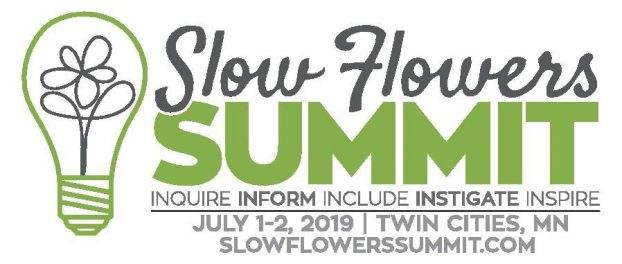 The 3rd Slow Flowers Summit will take place on July 1st and 2nd, 2019, in Minneapolis-St. Paul, Minnesota! Save the dates!
The 3rd Slow Flowers Summit will take place on July 1st and 2nd, 2019, in Minneapolis-St. Paul, Minnesota! Save the dates!
I’m so pleased that we have a co-host in Christine Hoffman, founder of Twin Cities Flower Exchange, a floral wholesale hub that represents local flower farmers and chemical-free practices, now in its 2nd season.
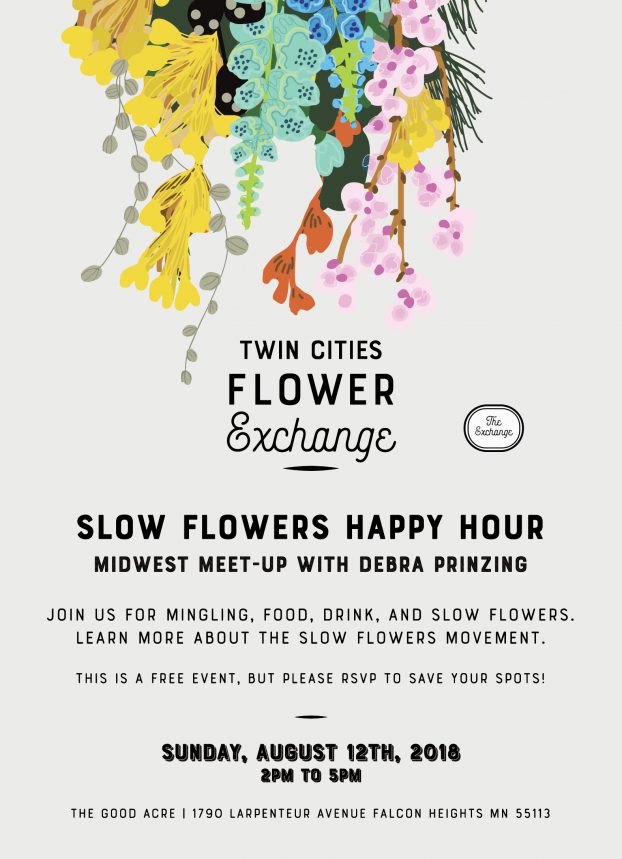
Christine is a past guest of this podcast and I’m so pleased that she agreed to welcome the Slow Flowers community to the Twin Cities – where a lot of exciting things are taking place in the floral world. To share more, I’ve asked Christine to join me for a short preview of what’s in store for you next year!
Sign up to receive Slow Flowers Summit 2019 Updates and Announcements here.
Listen to our past Podcast interviews with Christine:
Follow Twin Cities Flower Exchange on Instagram
And if you happen to find yourself in the Minneapolis-St. Paul area on Sunday, August 12th, please join me at a reception Christine is hosting for the local floral community. It will take place at Good Acre, the food hub that houses Twin Cities Flower Exchange. See Details & RSVP for the August 11th Slow Flowers Happy Hour
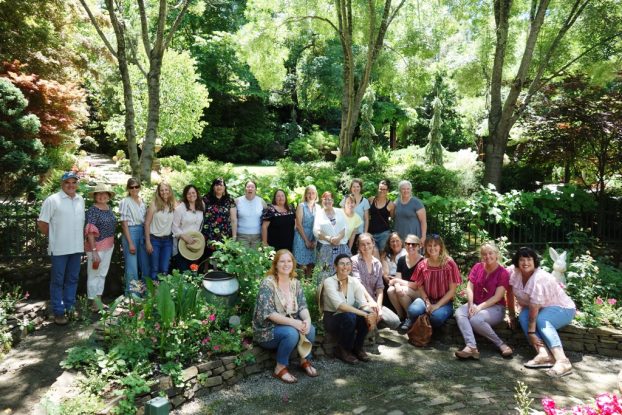
The Sacramento Slow Flowers Meet-Up gathered in early June at Scott Paris’s Maple Rock Gardens for a fabulous tour, lunch and dialogue
Okay, on to our next fascinating guest, Scott Paris of High Hand Nursery in Loomis, California.
I met Scott through succulent expert Robin Stockwell, who was a 2017 guest of this podcast when his book “Succulents” was published. As owners of independent nurseries, Robin and Scott move in the same circles. And recently, when Scott mentioned that he wanted to add cut flowers to his property, a private Sacramento area residence and gardens called Maple Rock, where High Hand Nursery hosts seasonal open gardens events, Robin told him to reach out to me.
Scott invited me to visit High Hand and spend a day in early June, talking about growing cut flowers. He generously agreed to my suggestion that we pull together the local flower farming and floral design community for a meet-up at Maple Rock Gardens.
On June 4th, about two dozen passionate local flowers people did just that. I took an early-morning flight from Seattle to Sacramento and Scott met me at the airport. We drove to High Hand Nursery, which completely blew me away, and ultimately, we met up at Maple Rock Gardens for garden touring, introductions and networking, a picnic garden lunch provided by High Hand and a brainstorming session about promoting local flowers in Sacramento.
What’s happening in the area is so exciting when it comes to interest and demand for local flowers. I am eager to return and continue engaging, especially with the dynamic Facebook group called Sacramento Flower Collective, several of whom were in attendance at our meet-up.
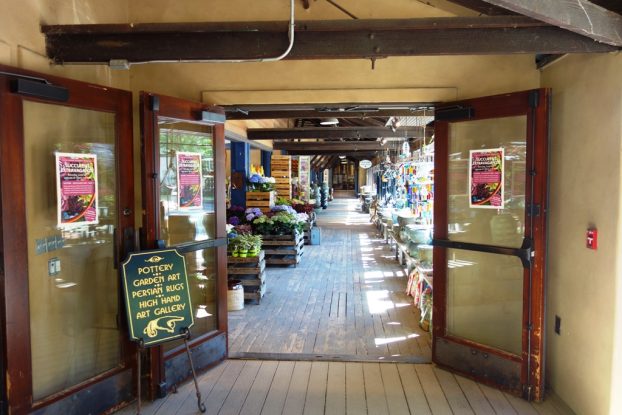
Welcome to the historic fruit-packing shed-turned specialty garden center and garden lifestyle destination.
Scott Paris will share the story of his full-service, multifaceted nursery and give you insights into how a single-location retail venue has realized great success despite independent garden centers going out of business right and left. The big boxes and regional chains have certainly taken a bite out of the nursery trade, but High Hand continues to thrive because of Scott’s ability to connect with customers through storytelling, unique plant offerings, and exciting special events.
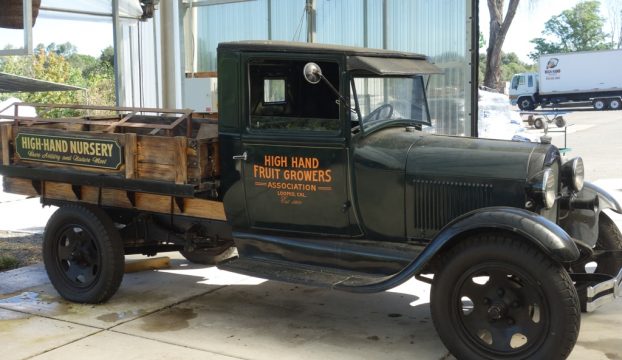
Scott underscores the historic connections to the orchards and fruit-packing through his branding and visual merchandising
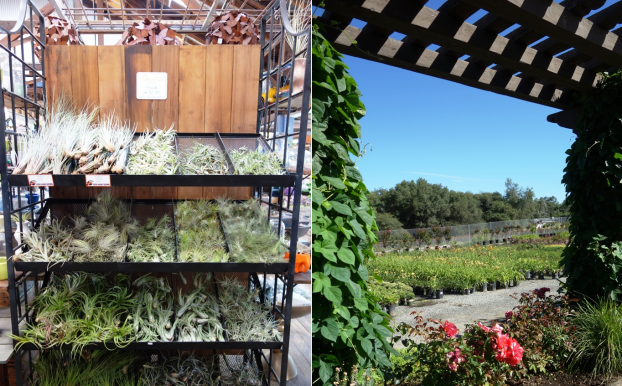
Indoors, a Tillandisa Bar. Outdoors, a field filled with nursery stock for retail and landscape customers.
The nursery is housed in a historic fruit packing shed, along with a cafe and a number of boutique shops, gourmet food offerings, art and antique galleries, vintage home and garden items, and other departments that make it possible to spend an entire day under one roof — High Hand Nursery is a definitely a lifestyle destination.
By the way, the High Hand brand dates back more than a century. In 1901, the Loomis, Calif.-based, Fruit Growers Association was founded — and continues to operate today. In 1926, the group constructed High Hand Fruit Sheds as its central packing plant. During peak operations, up to 100 workers were employed there during harvest season, packing and shipping local “Mountain Grown” fruit, under the HIGH-HAND label, to major markets around the world. Today the Hand-Made tradition is carried forward at High Hand Nursery. You can still get a sense of this history as you walk through the High Hand Fruit Shed, where workers’ names are still written on the posts and rafters of the historical building.
This is an inspiring story and I believe learning how Scott has connected his customers with horticulture may offer ways floriculture businesses can similarly connect with their market.
Here’s how to find and follow High Hand Nursery:
Receive High Hand’s newsletter
If you haven’t received the Slow Flowers’ July newsletter, check it out here — there are a number of things you won’t want to miss, including details about the just-announced Slow Flowers Summit 2019 and the just-posted call for applications for farmer-designer teams interested in creating one of our pieces for the American Flowers Week 2019 floral couture collection!
I am grateful to all our entire community of flower farmers and floral designers who together define the Slow Flowers Movement.
As our cause gains more supporters and more passionate participants who believe in the importance of the American cut flower industry, the momentum is contagious.
I know you feel it, too. I value your support and invite you to show your thanks and with a donation to support my ongoing advocacy, education and outreach activities. You can find the donate button in the column to the right.
 The Slow Flowers Podcast has been downloaded more than 335,000 times by listeners like you. Thank you for listening, commenting and sharing – it means so much.
The Slow Flowers Podcast has been downloaded more than 335,000 times by listeners like you. Thank you for listening, commenting and sharing – it means so much.
Thank you to our sponsors who have supported Slow Flowers and all our programs. They are:
Florists’ Review magazine. I’m delighted to serve as Contributing Editor for Slow Flowers Journal, found in the pages of Florists’ Review. It’s the leading trade magazine in the floral industry and the only independent periodical for the retail, wholesale and supplier market. Take advantage of the special offer for a free trial issue
Arctic Alaska Peonies, a cooperative of passionate family farms in the heart of Alaska providing bigger, better peony flowers during the months of July and August. Visit them today at arcticalaskapeonies.com
Seattle Wholesale Growers Market, a farmer-owned cooperative committed to providing the very best the Pacific Northwest has to offer in cut flowers, foliage and plants. The Growers Market’s mission is to foster a vibrant marketplace that sustains local flower farms and provides top-quality products and service to the local floral industry. Find them at seattlewholesalegrowersmarket.com
Longfield Gardens provides home gardeners with high quality flower bulbs and perennials. Their online store offers plants for every region and every season, from tulips and daffodils to dahlias, caladiums and amaryllis. Visit them at longfield-gardens.com.
Syndicate Sales, an American manufacturer of vases and accessories for the professional florist. Look for the American Flag Icon to find Syndicate’s USA-made products and join the Syndicate Stars loyalty program at syndicatesales.com.
Johnny’s Selected Seeds, an employee-owned company that provides our industry the best flower, herb and vegetable seeds — supplied to farms large and small and even backyard cutting gardens like mine. Check them out at johnnysseeds.com.
Association of Specialty Cut Flower Growers. Formed in 1988, ASCFG was created to educate, unite, and support commercial cut flower growers. It mission is to help growers produce high-quality floral material, and to foster and promote the local availability of that product. Learn more at ascfg.org
Mayesh Wholesale Florist. Family-owned since 1978, Mayesh is the premier wedding and event supplier in the U.S. and we’re thrilled to partner with Mayesh to promote local and domestic flowers, which they source from farms large and small around the U.S. Learn more at mayesh.com.
Certified American Grown Flowers. The Certified American-Grown program and label provide a guarantee for designers and consumers on the source of their flowers. Take pride in your flowers and buy with confidence, ask for Certified American Grown Flowers. To learn more visit americangrownflowers.org.
I’m Debra Prinzing, host and producer of the Slow Flowers Podcast. Next week, you’re invited to join me in putting more American grown flowers on the table, one vase at a time. And If you like what you hear, please consider logging onto iTunes and posting a listener review.
The content and opinions expressed here are either mine alone or those of my guests alone, independent of any podcast sponsor or other person, company or organization.
The Slow Flowers Podcast is engineered and edited by Andrew Brenlan. Learn more about his work at soundbodymovement.com. Special thanks to Stephen Yaussi.
Music Credits:









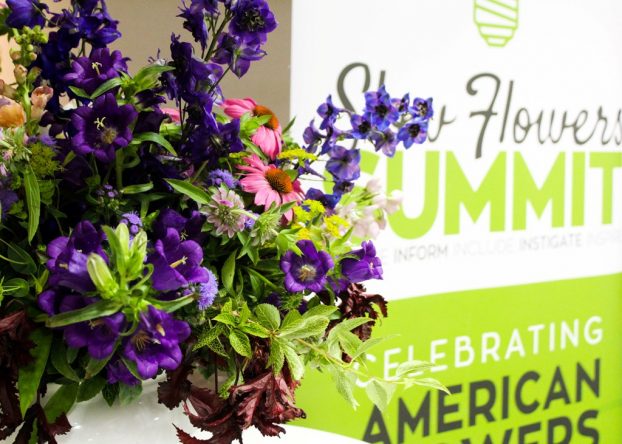
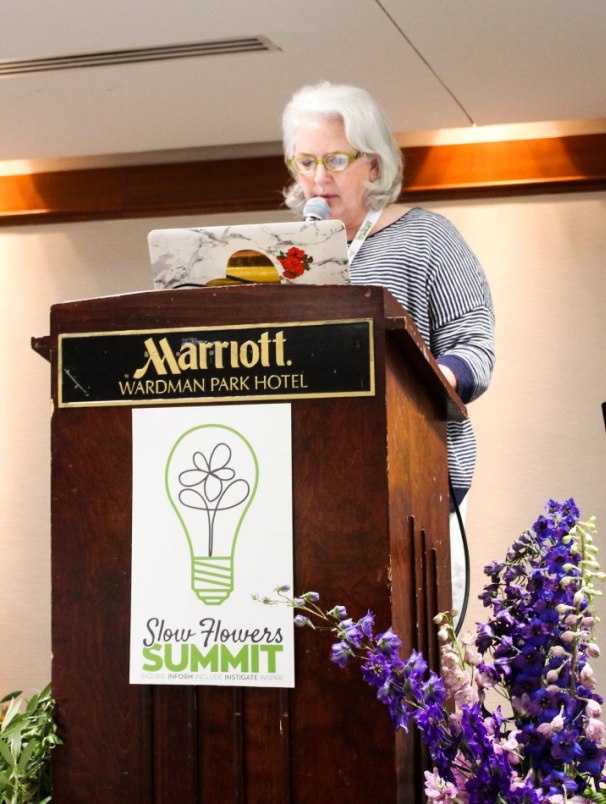
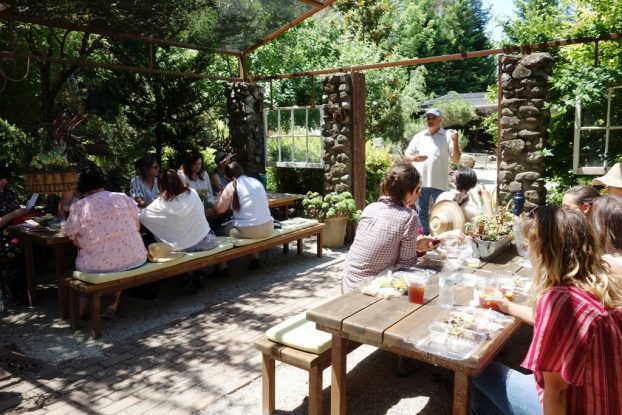
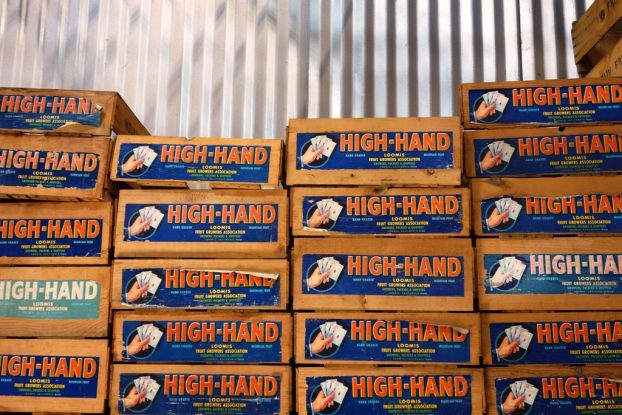
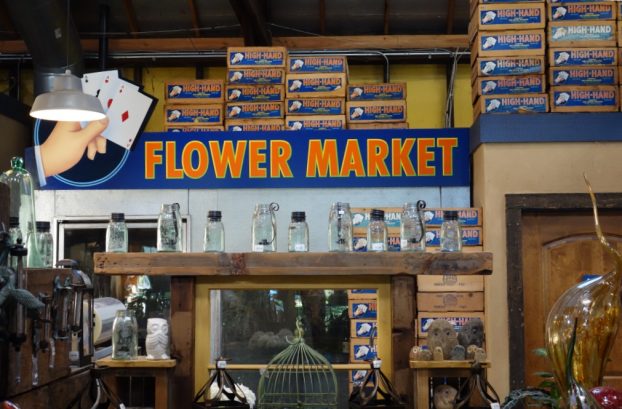
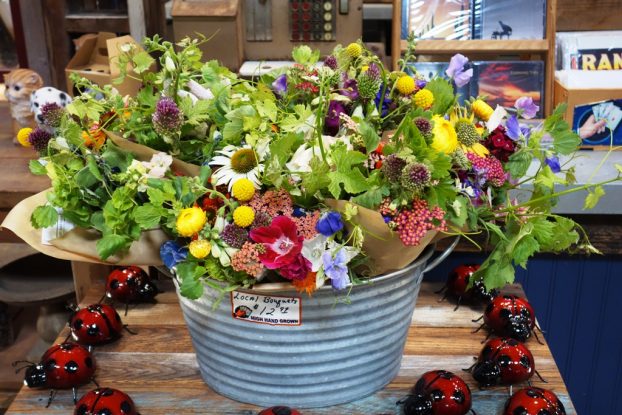
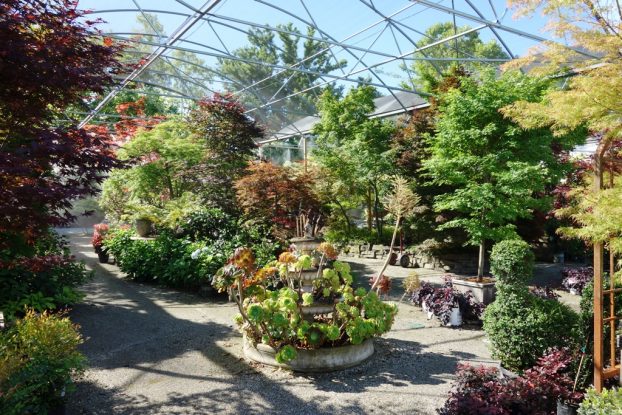
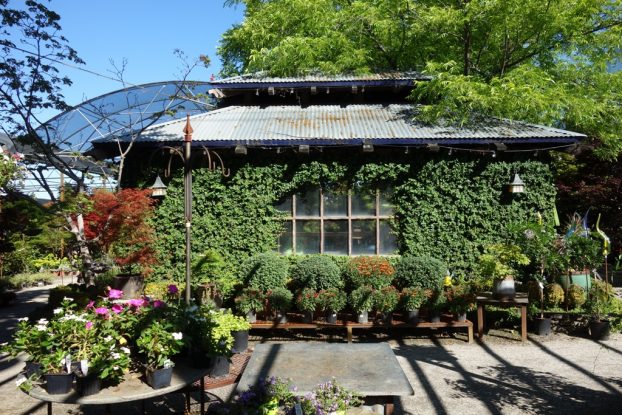
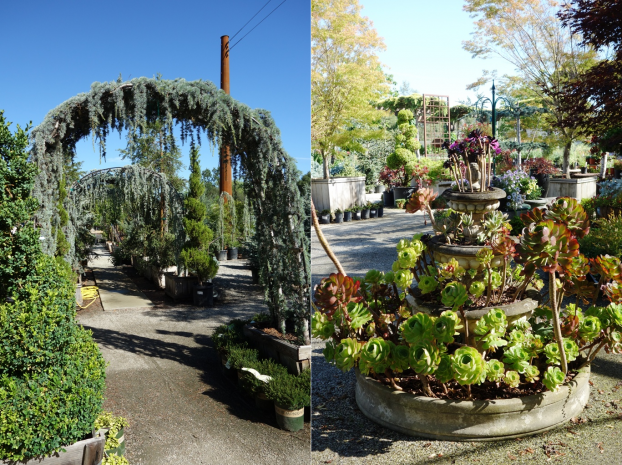
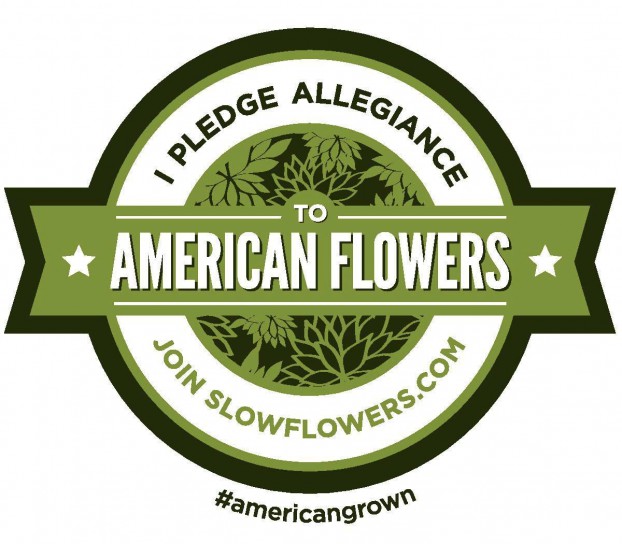
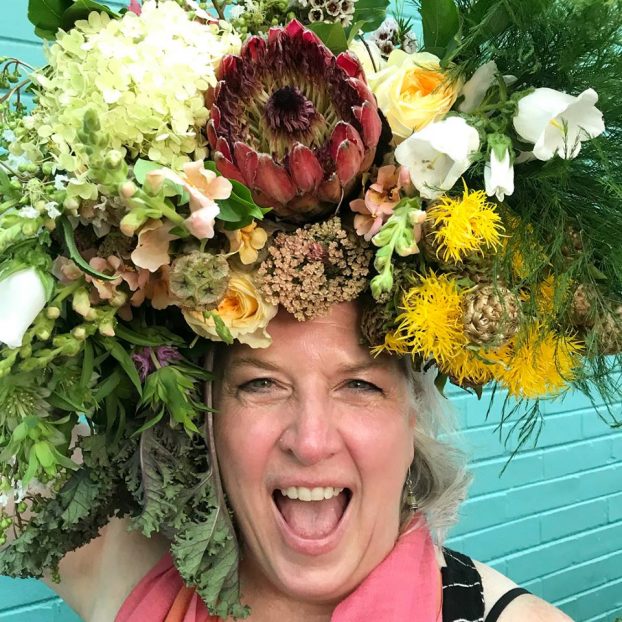
March 24th, 2021 at 8:46 am
[…] Today’s guest have been on my wish list to interview ever since we met in person at a Slow Flowers gathering in 2018, hosted by Scott Paris of High Hand Nursery, past guest of this podcast. […]